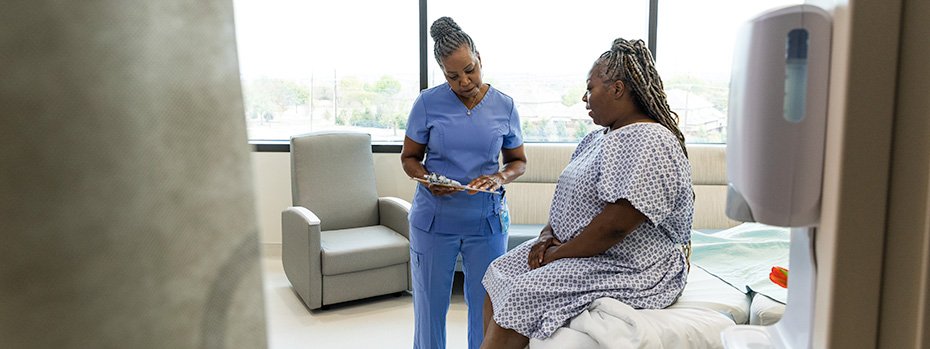Family Nurse Practitioner Degree Program (D.N.P.-FNP)

Family nurse practitioners provide primary care for patients across the lifespan. At OHSU, you learn to assess, diagnose and treat health conditions. You’ll also gain skills to promote wellness and deliver evidence-based care in a variety of settings.
Earn your Family Nurse Practitioner degree from OHSU
- Expert faculty and preceptors. Learn from experienced clinical preceptors and world-class educators dedicated to helping you succeed.
- Diverse clinical opportunities. Get hands-on training in community health centers, family practices and urgent care clinics in urban and rural areas.
- Clinicals experiences arranged for you. OHSU handles your clinical placements and preceptors, so you can focus on learning.
- Distance learning option. Rural students can attend classes online and in person at Ashland, La Grande, Monmouth or Klamath Falls, with travel to Portland once or twice a term.
- Small class sizes. Learn with a cohort of fewer than 25 students and benefit from a 1:3 faculty-to-student ratio.
- Proven success. Most graduates pass their FNP certification exams on their first try.
Nursing scholarships
$9,000 for new Family Nurse Practitioner students
Contact us
- Ask admissions
- Attend an information session
- Call us at 503-494-7725 or 866-223-1811 (toll free)
Admission and application requirements
Admissions requirements
- B.S.N. or B.S. with a major in nursing by the time you start the program
- RN license. If you don’t have one, you can get conditional admission, but you need a license before your first clinical course.
- 3.0 cumulative GPA (all undergraduate and graduate level coursework)
- Preferred science GPA of 3.0
How to apply
- Application will reopen in Aug. 2026.
- Go to Nursing CAS and apply.
- Enter your college courses in Nursing CAS.
- Submit 3 letters of reference, your resume and essays in Nursing CAS.
- Send transcripts to Nursing CAS. Contact Nursing CAS to ensure your transcripts arrive.
Tuition and scholarships
- Cost: $713 per credit for Oregon residents and $926 for non-residents. Learn more about tuition and fees.
- Scholarships: Access more nursing scholarships than ever before. You may also qualify for loan forgiveness and repayment programs.
Classes and degree requirements
You need 115 credits to earn your Family Nurse Practitioner D.N.P. degree. This includes 25 credits from clinical practicum courses (1,000 clinical hours) and 7 credits from D.N.P. project courses.
Why earn your D.N.P.-FNP degree at OHSU?
During OHSU’s Family Nurse Practitioner program, you’ll learn from leading health care experts and graduate with a degree from Oregon’s only academic health center.
- Earn a high-quality education. Learn from renowned faculty known for their research and innovations in clinical care.
- Enjoy distance learning. Rural students can take most classes online, with some in-person coursework and clinicals in Ashland, La Grande, Monmouth or Klamath Falls, plus travel to Portland once or twice a term.
- Experience innovative learning. Practice in state-of-the-art clinical simulation labs designed to prepare you for real-world challenges.
Still have questions? Contact an admission counselor to schedule a call.
Family Nurse Practitioner D.N.P degree program FAQs
Can I enroll in the Family Nurse Practitioner program if I don’t live in Portland?
Yes. OHSU’s Family Nurse Practitioner program is offered both on the Portland campus and statewide in Oregon. For distance students, you’ll complete most coursework online. Faculty works to make sure you receive the same high-quality education, no matter your location.
You’ll travel to Portland once or twice per term for up to three days. Additional travel to regional campuses in Monmouth, La Grande, Ashland or Klamath Falls may be required. Some terms require no travel, while others may need up to two visits per month. Winter term travel is less frequent to avoid weather issues. Schedules are shared two to three months in advance to help you plan.
Are scholarships available to become a family nurse practitioner?
OHSU offers a variety of scholarships to help fund your degree. Additionally, loan repayment options are available for D.N.P. students.
How are clinical placements and preceptors arranged?
OHSU arranges both your clinical placements and preceptors. We work with top preceptors across Oregon, so you’ll learn from some of the best clinicians in the state.
What areas of care will I study in the Family Nurse Practitioner program?
The program covers a broad range of topics, including advanced health assessment, pharmacology, pathophysiology, health promotion and managing both acute and chronic illnesses. You’ll also develop skills in primary care, reproductive care and prenatal care.
What is the employment rate for OHSU Family Nurse Practitioner graduates?
The majority of OHSU Family Nurse Practitioner graduates have been employed within six months of graduation, with most securing positions within three months.
How long does it take to become a family nurse practitioner?
You can complete the Family Nurse Practitioner D.N.P. program in three years.
Still have questions? Contact an admissions counselor.
Accelerated B.S. to FNP pathway
If you’re pursuing your B.S. in nursing and want to become a family nurse practitioner, you can apply to the accelerated B.S. and the FNP programs with one application. This lets you transition directly into the D.N.P. program after earning your B.S.

Accreditation
OHSU is accredited by the NWCCU and OHSU School of Nursing is accredited by the CCNE.